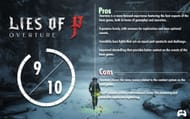Lies of P Overture is everything I asked for from a Lies of P DLC. It's a short but incredibly well-paced expansion that offers everything I loved about the base game while also addressing some of the major complaints I had with it.
Although it's not perfect and does not come close to reaching the heights of other premium souls-like DLCs, Overture is still an excellent addition and capstone to Lies of P's base game.
It's essentially the same thing as the base experience, albeit in a more condensed format, focusing primarily on the things that made the Lies of P experience great in the first place. From brutally challenging bosses to incredibly unique weapons, the DLC has it all. It also comes with some genuinely riveting story revelations.
While I do have some major complaints regarding the DLC, Lies of P Overture is undoubtedly one of the best souls-like experiences I've had in a long while.
Looking for Crossword hints & solutions? Check out latest NYT Mini Crossword Answers, LA Times Crossword Answers, and Atlantic Crossword Answers
What's new in Lies of P Overture?

Lies of P Overture doesn't try to reinvent the wheel in any way. Instead, it sticks very close to what worked in the base game, refines some of its mechanics, and delivers a rather compelling package with some of the best boss fights in any souls-like to date. While I would've liked to see some innovation in terms of gameplay, I'm very much content with what's delivered.
Overture is a roughly 12-15 hour journey, which is substantial for a story DLC. However, if you plan to see everything it has to offer, it can easily last you 20-25 hours. It's essentially half the length of the base game, featuring five chapters and four major story bosses. It also features plenty of cutscenes, which was a welcome surprise.
In addition, the chapters in Lies of P Overture are larger compared to the ones in the base game. They aren't comparable to Nioh or Elden Ring, but they are fairly lengthy and often offer multiple paths to explore. One of the best examples of this is in Chapter 2, where you eventually reach a Carnival.
This area is fairly linear if you simply follow the main story quest. However, if you choose to explore, there's a ton of optional content to break up the game's pacing. There are short mini-games as well, which require you to either solve a simple puzzle or defeat a mini-boss. Additionally, this region is also home to secret loot and even an NPC side quest.

In this regard, the second-last chapter is probably my favorite since it houses multiple paths that coalesce into the main story progression route, as well as optional mini-boss encounters that reward you with, well, a satisfying "payout."
Despite their length, the chapters in Lies of P Overture don't overstay their welcome, just like in the base game.
Apart from these key new additions, Overture is basically "more Lies of P," and that's probably for the best.
The narrative "thread"

As much as I like souls-likes, I do think that most games under this genre fumble a lot when it comes to storytelling. Most souls-likes try to emulate the indirect storytelling approach of FromSoftware's titles, often without understanding how to actually go about it.
FromSoftware tries to deliver its stories via the game's assets, the environment, more so than dialogue itself. And doing so is significantly more challenging than it might seem; just take a look at 2023's Lords of the Fallen, for instance.
Perhaps this is why I like games like Lies of P, which don't concern themselves with copying the FromSoftware formula beat-for-beat, especially when it comes to storytelling.
Lies of P, despite its convoluted narrative, approaches storytelling in a more direct way, offering players plenty of cutscenes and even "expository sequences." Unlike most souls-like games, its story is quite straightforward. Even if you don't pay too much attention to the dialogue or skip a few NPC interactions, you will still be able to deduce the story's gist on your own.
This aspect has been carried over gracefully by Lies of P Overture and even improved upon. The story is perhaps my favorite aspect of the DLC, only seconded by the boss fights.
I won't go into spoilers, but the story here really gripped me, more so than I had expected. Overture essentially transports you to the past, right at the cusp of the "Puppet Frenzy." From there, the DLC throws multiple curveballs at you in the form of mysteries, character revelations, and even the ending itself.
The story starts with the objective of finding out why you were transported to the past and eventually evolves into something more personal.

Lies of P Overture also does something truly exceptional with how it handles the narrative continuity.
As much as I like FromSoftware, the DLC in its games seldom loops back into the base game's main story. Take Shadow of the Erdtree, for instance. At the end of Shadow of the Erdtree, you get to fight (and defeat) Miquella himself. However, doing so does not affect the base game's progression or any of the boss fights in that.
Imagine if you complete Shadow of the Erdtree and then return to the Haligtree, but instead of fighting Malenia, you can choose to let her know of her brother's fate. This small interaction could've elevated the impact of the expansion tenfold.
However, as it stands, Shadow of the Erdtree and the base Elden Ring both feel like completely separate entities.
That's not the case with Lies of P Overture, for the most part. While the DLC doesn't affect the continuity of the base game, it does add some unique interactions with certain NPCs, which I've never seen implemented in any souls-likes to date.
I won't go into the specifics, but once you finish Overture, I highly recommend going for a second playthrough just to witness these unique interactions.
Quality over quantity

Let me tell you, if you like boss fights and are craving a challenge, you should definitely give Lies of P Overture a shot. The base game already featured some of the best boss fights in any souls-like to date; just take a look at the King of the Puppets, Laxasia, Simon Manus, and the Nameless Puppet. However, the bosses in the DLC are even better.
There aren't that many bosses, but the ones that are around are of the utmost quality and far surpass anything in the base game.
The final boss in Overture gave me flashbacks of the very first time I fought Isshin, the Sword Saint, in Sekiro. And hear me out, I think the final boss in Lies of P's DLC surpasses Isshin in more ways than just difficulty.
I don't think the bosses in Lies of P Overture are too difficult, especially if you're good at timing your parries. However, the spectacle of these battles alone made me a fan of them.
There's an early-game boss in the DLC, Markiona, who uses a puppet tethered to her to not only attack you but also repel any incoming damage. This is probably the best example of "duo bosses done right" in any souls-like game I've ever played.
Markiona mostly uses her puppet to deal with you if you try to stay at a range. However, once you get close to the boss, she mostly relies on her own attacks, with the puppet mostly being there to divert your attacks.
I also liked the fact that Lies of P Overture does not rely on multi-phase bosses all that much. This was one of the most annoying aspects of the base game.

During the tail-end of Lies of P, most bosses came with two full health bars, which is a gimmick I'm not a fan of. Overture limits this to only the final boss, and even then, it makes it so that the first phase isn't as tanky as the second. This not only allows you to learn both phases more frequently but also gives you a better chance at victory, even on your very first attempt.
And what's better is that I can replay these fights any time I want, without having to start a fresh playthrough. You see, with the DLC, developer Round8 Studios also added a "boss rush" mode to the game. The boss rush mode features its own cosmetic rewards, which is a great way to encourage players to try it out.
Few shortcomings

While I loved every second of Lies of P Overture, the DLC does have its fair share of issues. One of my major complaints regarding the base game was its overdependence on parries. While there are a ton of different weapons to choose from, as well as a rather robust build crafting system, the combat in Lies of P ended up boiling down to parries and nothing else.
Despite the intricate RPG systems in place, you're forced into a single playstyle. Pairing that with the often "janky" hitbox and a rather tight parry/counterattack window, Lies of P often felt like an exercise in frustration more than an engaging souls-like experience.
The same issues affect Overture, albeit with some improvements. Round8 Studios did improve the game's hitbox issues that I mentioned in my original review, which makes the combat feel more snappy and, well, fun. However, it's still a very "parry-heavy" experience. And if you're not a fan of that mechanic, I don't think the DLC will help change your outlook towards the game.
In addition, there are a few other things that I think are quite annoying and should've been addressed with Lies of P Overture.
Firstly, there's no dedicated pause system in the game. Unlike in Elden Ring, Dark Souls, or Demon's Souls, Lies of P is a single-player-only title. As such, there's no reason for the game's lack of a pause mechanic.
It could've been implemented just like in Sekiro. Or, if the developer wants to force restrictions on the player, it could've implemented the mechanic in a way that does not allow you to switch your loadout during combat, even if you pause the game.

Lastly, while Overture is quite well-optimized, it does ship with quite a few technical issues on PC.
One of the recurring issues I faced on my system was the game's tendency to stutter upon reaching a new destination or attempting a boss fight for the first time. These stutters were due to the game compiling shaders during these instances, as evident by the CPU usage spike. However, these issues should not be happening during gameplay.
Another issue I faced with Lies of P Overture was the game not reading controller inputs upon booting it for the first time. I had to use the mouse and keyboard to navigate to the main menu, and only then could I use the controller to play. This is a mild inconvenience, but an inconvenience nonetheless.
Apart from that, Overture is a rather polished experience.
In conclusion

Lies of P Overture is essentially more of what fans loved about the base game, with some major improvements to not only the gameplay side of things but also the storytelling. It doesn't try to reinvent the wheel with its combat system or moment-to-moment gameplay loop. Instead, the DLC iterates over what worked in the base experience and delivers more of the same.
If you liked what you played in base Lies of P, Overture is an easy recommendation. However, if you did not gel with the base game, Overture isn't going to change your mind. It's still the same Lies of P experience, albeit with new bosses, weapons, and more engaging storytelling.
Lies of P Overture

Reviewed on: Windows PC (Review code provided by Neowiz)
Platform(s): PS5, PS4, Xbox Series X|S, Xbox One, and Windows PC (Steam)
Developer(s): Round8 Studios, Neowiz
Publisher(s): Neowiz
Release date: June 6, 2025
Are you stuck on today's Wordle? Our Wordle Solver will help you find the answer.
